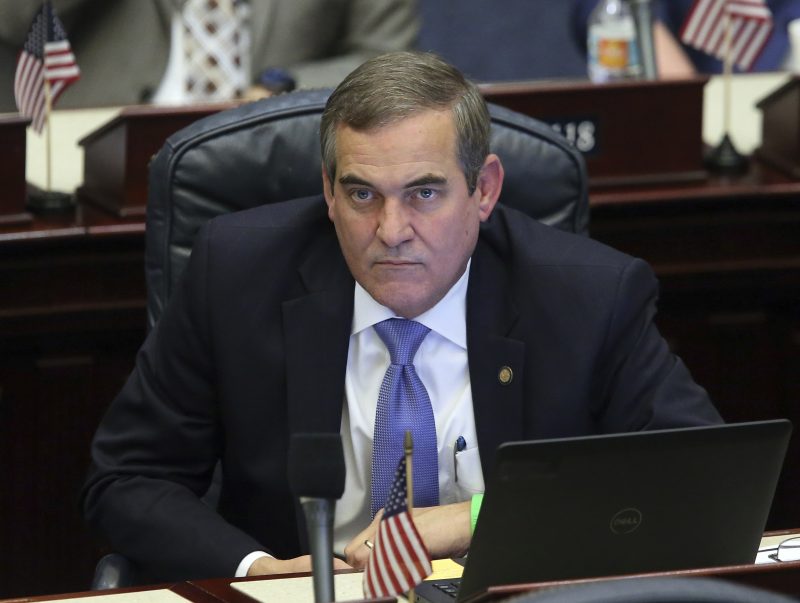
Florida bill would ban young girls from discussing periods in school


As Florida Republicans are introducing and advancing a wave of bills on gender and diversity that are likely to be signed into law by Gov. Ron DeSantis (R), one GOP lawmaker acknowledged this week that his proposed sexual health bill would ban girls from talking about their menstrual cycles in school.
During a Florida House Education Quality Subcommittee hearing Wednesday, state Rep. Ashley Gantt (D) questioned her Republican colleague, state Rep. Stan McClain, on his proposed legislation that would restrict certain educational materials used in state schools, which Democrats and critics have likened to banning books. House Bill 1069 would also require that instruction on sexual health, such as health education, sexually transmitted diseases and human sexuality, “only occur in grades 6 through 12,” which prompted Gantt to ask whether the proposed legislation would prohibit young girls from talking about their periods in school when they first start having them.
“So if little girls experience their menstrual cycle in fifth grade or fourth grade, will that prohibit conversations from them since they are in the grade lower than sixth grade?” Gantt asked.
McClain responded, “It would.”

Watch Florida State Rep. @StanMcClain tell Rep. @Gantt4Florida that his bill prohibits young people from talking about their period….
WHAT?!?! pic.twitter.com/PoEgRm4sK0
— Florida Planned Parenthood Action (@PPactionFL) March 15, 2023
The GOP lawmaker representing Ocala, Fla., later clarified that it “would not be the intent” of the bill to punish girls if they came to teachers with questions or concerns about their menstrual cycle, adding that he’d be “amenable” to amendments if they were to come up. The bill ended up passing, 13-5, on Wednesday in a party-line vote, as GOP legislators make up a supermajority in the chamber.
McClain did not immediately respond to a request for comment early Friday. Gantt decried the bill to The Washington Post as “egregious.”
“I thought it was pretty remarkable that the beginning of a little girl’s menstrual cycle was not contemplated as they drafted this bill,” she said on Friday.
Gantt was echoed by advocates such as Annie Filkowski, the policy and political director of the Florida Alliance of Planned Parenthood Affiliates, who told The Post that “young Floridians will suffer if this legislation becomes law.”
“This bill shines a bright light on Florida’s political leaders’ perpetual thirst for power and control,” Filkowski said in a statement, adding that it was “ridiculous” to prohibit young girls from discussing menstruation with their teachers.
McClain’s proposed legislation is among a spate of new Republican-sponsored bills that could reshape K-12 and higher education in Florida. Bills filed by GOP state representatives and senators in recent weeks range from requiring teachers to use pronouns matching children’s sex as assigned at birth to establishing a universal school-choice voucher program. Other proposed legislation would eliminate college majors in gender studies, cut diversity efforts at universities and job protections for tenured faculty, strengthen parents’ ability to veto K-12 class materials and extend a ban on teaching about gender and sexuality — from third grade up to eighth grade.
Democrats, free-speech advocates and LGBTQ groups say the Republican bills would restrict educators’ ability to instruct children honestly.
Even with the blowback, Florida Republicans advanced two bills Monday that would ban gender-affirming care for minors and eliminate diversity programs in colleges. Another proposal was advanced Tuesday that would ban classroom lessons on gender identity and sexual orientation through the eighth grade. The expansion of the controversial bill, which critics have labeled “Don’t Say Gay,” has vocal support from DeSantis, a potential Republican presidential candidate in 2024.
Menarche, when girls first start to menstruate, typically occurs between the ages of 10 and 16, according to the National Library of Medicine at the National Institutes of Health. Doctors, parents and studies from around the world have reported a surge in early puberty cases for girls during the pandemic, with some girls getting their periods as young as 8.
Restricting girls from talking about their periods in school is not the only item in McClain’s bill, which was introduced last month. The bill calls for schools to teach how “sex is determined by biology and reproductive function at birth” and “these reproductive roles are binary, stable, and unchangeable.” Part of the proposed legislation would require that the Florida Education Department approve all education materials used in sexual health. It would also give parents the right to limit the kinds of library books their children can check out.
On Wednesday, Gantt denounced McClain’s bill, and the limits around what educational materials can be accessed by children, as a form of “book banning” that would weaken students’ education, according to the News Service of Florida.
“I hope that we all understand that we are taking away the ability for our children to be critical thinkers, by telling them we want to protect their innocence,” Gantt, who represents Miami, said during the hearing. “They’re going to be adults one day, and they need to be informed adults.”
McClain refuted the claims against and criticism of the bill, arguing that “a lot of the things that were brought forward were misinformation.”
“This idea that book banning is taking place, and all of that, is a myth and is not true,” McClain said. “Members, what we’re trying to do is ensure that our parents continue to have the opportunity to know what materials are being used to instruct [their children] and to have the ability to challenge that.”
The bill next heads to the floor of the state House. If it passes the Republican-controlled chamber, it still needs to pass through the state Senate before it is likely signed into law by DeSantis.
Whether any amendments will be made to the bill to allow for young girls to talk about their periods in school remains unclear, Gantt told The Post. She again criticized the bill for not preparing children to eventually become informed adults.
“We don’t get do-overs with children, we don’t get that opportunity again,” she said. “So why are we implementing or proposing policies from stopping little girls from understanding their body?”
Hannah Natanson, Lori Rozsa and Susan Svrluga contributed to this report.
